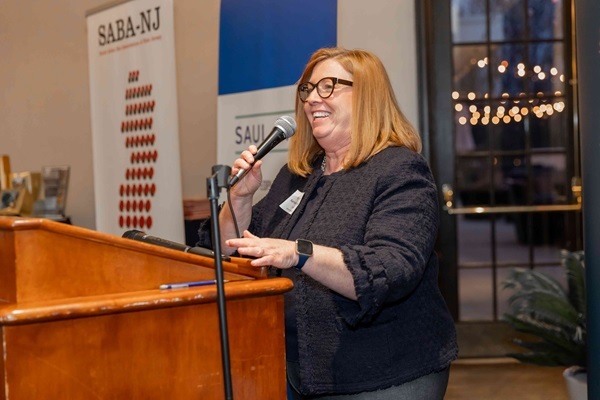Kathleen Coviello: A Career Supporting Entrepreneurs While Balancing Life and Work
In celebration of International Women’s Day in March, about 100 members of TiE New Jersey gathered at the Cherry Valley Country Club, in Skillman. They heard from Kathleen Coviello, chief economic transformation officer at the New Jersey Economic Development Authority (NJEDA), who has spent much of her career in the service of tech entrepreneurship.
Her current duties at the NJEDA include overseeing the Authority’s strategic sector, economic transformation products (corporate tax credit programs, clean energy and offshore wind products, innovation and venture products and strategic innovation centers) and the Product Operations Department.
A Career Shaped by Mentorship
Coviello’s career was shaped by good advice from both male and female mentors. “I started in the banking industry right out of college. I worked for an incredible mentor, a man who became a very dear friend. And he said to me, ‘The best thing you can do in banking is to become a lender. And if you if you do go that path, there will be tremendous opportunities for you. But first, you have to go through credit underwriting.’ That sounded like a horrible job I didn’t want to do. And I was right. I hated every second of it. But I got through it. And it’s a career skill that I had to have.”
She advised her listeners to think about where they want to go. “Listen to smart people because they’ll help guide you.”
Finding Creative Solutions for Tech Entrepreneurs
Another turning point for Coviello came early in her career, when she listened to a fundraising pitch from a team of startup entrepreneurs who were struggling to get capital. “They told me how they were executives at a company called ‘Eagle’s Eye.’ They emptied their 401Ks and mortgaged their houses.” They had used every single dollar they possessed to start their company. No one would take their calls because startups in the fashion field were risky. “And they proceeded to tell me about their business model and why they thought the company would do so well.”
Coviello decided to go the extra mile for this company because she believed in its story. “I went to our banking credit committee — the first time I ever went. And I said, ‘I have a startup apparel manufacturer.’ And the credit officer said, ‘Sorry, we don’t do startups. And we don’t do apparel manufacturers.’ And I said, ‘But I really believe in this team.’”
Her presentation got her a chance to go to the credit committee. “We created a unique financing structure, something the bank had never done before. And it was really, really fun. It was challenging. And it was interesting. And I had a great team to work with. And the credit committee bought it. They’re like, ‘Okay, you’ve structured this in such a unique way to protect the downside risks that we’re going to back this company.’”
On the heels of working with these incredible entrepreneurs is where I found my passion. Kathleen Coviello
Coviello pointed out that the company did very well under the name of Lilly Pulitzer, and that started her career working with startups on financing. Other startups heard about her skills and were looking for her help. She spoke of shepherding another startup through, from structuring the company to succession planning, when the founder and CEO came to her and said that he didn’t have the skills to lead the company through its tremendous growth to the next level. He ultimately sold the company, which was the right thing to do.
“So, on the heels of working with these incredible entrepreneurs is where I found my passion,” she told the assembled group.
This led to working for several banks in this area and, finally, to a bank in California that “no one in New Jersey had ever heard of.” It was Silicon Valley Bank, which worked with tech companies and had a famous flameout last year. She was flying all over the United States and she had three small children at home in New Jersey.
Coviello ventured an opinion about Silicon Valley Bank’s failure in the market, noting that it wasn’t due to the entrepreneurs they worked with, but to bad executive decisions. “Their business model worked, but it was a basic model. They supplied the funding to companies that were venture-backed by VCs they knew. “I thought it was going to be exciting. But, basically, you can pick from chocolate or vanilla. And that’s all they have. I kind of like mint chocolate chip, and they don’t have any of that there.”
Supporting Entrepreneurs at the NJEDA
She began looking for a more creative way to help entrepreneurs while staying close to home to raise her small children. As an aside, she noted that when she went for her MBA, no one talked about work-life balance or how a woman was supposed to manage a career with three little children at home. And the children were getting more vocal about her constant travel.
She met Caren Franzini at the New Jersey Tech Council (now TechUnited:NJ). Franzini was the CEO of the NJEDA. Coviello thought that the state wasn’t working with entrepreneurs in the right way. It needed to support the entrepreneurs “that have a vision and have a dream, and [it should be] sharing in the upside of these companies.” She noted that she expected to be with the NJEDA for just a little while; instead, she’ll mark 19 years in August.
“I started as the advocate for tech: ‘We’ve got to work with tech, we’ve got to do something with tech,’” she said. “Fast forward, and we have a governor who is totally committed to tech. I have the privilege of working for an incredible CEO who gives me a lot of runway and, what’s most important, an incredible, incredible team.”
She also praised the creativity of the NJEDA, which produces programs that are not just clones of what’s happening in other states. “We listen to business pain points” and we try to create programs that address those pain points within the guardrails of being the bank for the state, she said.
The program also included a panel discussion featuring New Jersey women entrepreneurs that delved deep into the challenges and opportunities facing women. We will cover that panel in a future article.
TiE was founded in 1992 in Silicon Valley by a group of successful entrepreneurs, corporate executives, and senior professionals. There are currently more than 12,000 members and over 1,800 charter members in 61 chapters in 12 countries. The New Jersey chapter is particularly active, with many programs during the year that support New Jersey entrepreneurs.




